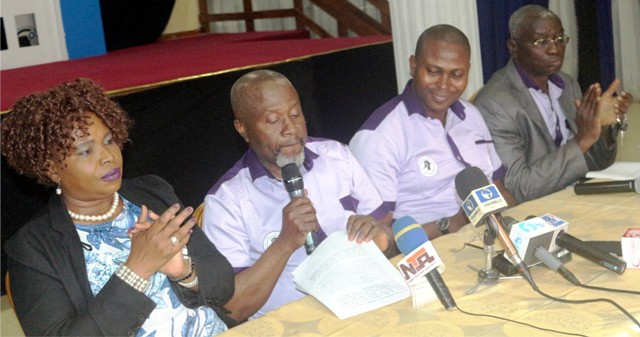Opinion
Corrupt Judges In A Whirlpool?

There is no doubt that many individuals and organizations, on daily basis, suffer unquantifiable damages and trauma following unsuspecting actions of some persons in positions of authority, whose place it is to protect their rights and privileges and those of the downtrodden in general.
While some of the injured and traumatized may vent their feelings against the actions of such persons or institutions which they represent, others allow theirs to suffocate in them. The result is a total loss of faith in both the defaulting authorities and the institutions.
Every office or institution has an oath that guides its operations. Its integrity is daily reaffirmed as long as the oath is not violated. Unfortunately, it is only selfish desires that lure serving office holders to violate the oath of office which they have afore-hand, sworn to do justice to all without favour, ill-will or affection, preserve, defend and protect the Constitution of the Federal Republic of Nigeria. This is in addition to refraining from allowing their personal interests to influence their official conduct or decision.
Thus, selfishness, when not nibbed in the bud, often develops into severe cankerworms that eat deep into the fabric of any system from which Nigeria is not exempted.
For the purpose of upholding the tenets of professional and institutional operations in Nigeria, regulatory bodies are put in place to check and hold operations in line with ethical standards for efficient delivery. Although some regulatory bodies only exist in names, there are still such that have continued to be alive to their responsibility of making sure standards are not compromised.
The National Judicial Council (NJC) is one of such bodies whose effort in this regard cannot be overlooked. The recent surveillance by the body of its members may not be unconnected with allegations of corrupt practices leveled against some of the members, which is becoming messier as some lately admitted to have been approached for favour by some politicians.
As a growing child, I was told that the judiciary is the last hope of the common man, a reason that justified the advocacy for the independence of the judiciary. Unfortunately, recent developments in the judiciary tend to run fowl of this age-long recitation and belief, leaving the talakaewa to ask if the institution still remains the commoners’ messiah, or should we expect another?
To clear all doubt, the NJC, during the reign of Justice Mukhtar Aloma, as the Chief Justice of the Federation, recommended the retirement of some judges, as penalty for corrupt practices, a move that was adjudged laudable and courageous.
The NJC could well be said to have merely exercised its constitutional powers, as a key player in the appointment, promotion and discipline of judges at both Federal and State levels. On the other hand, as an institution domiciled in Nigeria, where standards sometimes seem to be compromised, the then action of the NJC, which manifested in the compulsory retirement of two judges found wanting in the execution of their statutory duties, went a long way to rekindle the common man’s hope in the judiciary as well as reaffirmed the truism that nobody is above the law.
The subsequent implementation of the NJC’s recommendation by the Jonah Jang’s administration in Plateau State further sent a signal to all and sundry that corruption in the judiciary could no longer be tolerated.
Just recently, the NJC constituted panels to investigate 15 high court judges over their alleged involvement in various acts of judicial corruption, among whom are two serving chief judges. In the case of Justice Musa Ibrahim, whom the council urged the Zamfara State government to sack from office after it was proved that he demanded and got gratification from a litigant, Nigerians are watching the outcome of the investigation.
No doubt, the foundation of the nation’s judiciary has of late been shaken by unprecedented scandal. Nothing more than treating allegations of corrupt practices among judicial personnel with the urgency it requires can suffice, if the image of the judiciary must be sustained.
Sylvia ThankGod-Amadi
Opinion
Tackling Noise Pollution in Nigeria

Opinion
As Sim Turns Golden

Opinion
Policy Intervention: More Than Administrative Reform

-

 Niger Delta3 days ago
Niger Delta3 days agoPDP Declares Edo Airline’s Plan As Misplaced Priority
-

 Sports3 days ago
Sports3 days agoSimba open Nwabali talks
-

 Nation3 days ago
Nation3 days agoHoS Hails Fubara Over Provision of Accommodation for Permanent Secretaries
-
Niger Delta3 days ago
Stakeholders Task INC Aspirants On Dev … As ELECO Promises Transparent, Credible Polls
-
Niger Delta3 days ago
Students Protest Non-indigene Appointment As Rector in C’River
-

 News5 days ago
News5 days agoDon Lauds RSG, NECA On Job Fair
-

 Oil & Energy3 days ago
Oil & Energy3 days agoNUPRC Unveils Three-pillar Transformative Vision, Pledges Efficiency, Partnership
-
Rivers3 days ago
Fubara Restates Continued Support For NYSC In Rivers

